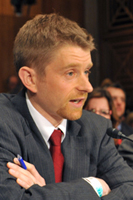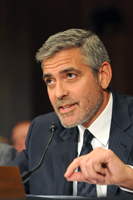USIP's Jon Temin Testifies Before the Senate on the "Two Sudans"
Drawing on the expertise of USIP’s Jon Temin, the Senate Foreign Relations Committee invited him to testify on “Sudan and South Sudan: Independence and Insecurity” on Wednesday, March 14, 2012. The hearing focused on unresolved issues following South Sudan’s secession last July, including humanitarian access and an impasse over oil transit. The hearing also examined violence and division in South Sudan, the state of democracy on both sides of the border, and prospects for progress in Darfur.

 Drawing on the expertise of USIP’s Jon Temin, the Senate Foreign Relations Committee invited him to testify on “Sudan and South Sudan: Independence and Insecurity” on Wednesday, March 14, 2012. The hearing focused on unresolved issues following South Sudan’s secession last July, including humanitarian access and an impasse over oil transit. The hearing also examined violence and division in South Sudan, the state of democracy on both sides of the border, and prospects for progress in Darfur.
Drawing on the expertise of USIP’s Jon Temin, the Senate Foreign Relations Committee invited him to testify on “Sudan and South Sudan: Independence and Insecurity” on Wednesday, March 14, 2012. The hearing focused on unresolved issues following South Sudan’s secession last July, including humanitarian access and an impasse over oil transit. The hearing also examined violence and division in South Sudan, the state of democracy on both sides of the border, and prospects for progress in Darfur.
WATCH HEARING VIDEO OF TESTIMONY, INCLUDING USIP'S JON TEMIN, HERE
The first panel featured Special Envoy Princeton Lyman and USAID Assistant Administrator Nancy Lindborg. Temin, Sudan activist George Clooney, and John Prendergast, the co-founder of the Enough Project, appeared on the second panel. The Institute has been working on the conflict in Sudan for 18 years, training peacebuilders and assisting the U.S. government in resolving the dangerous and deadly conflict.
In his remarks, Clooney warned the Senate committee that the Sudanese government was committing "war crimes" along the border of South Sudan.
“There seems to be the exact same signs that we saw in the beginning of Darfur, which is a government bombing innocent civilians, and we were there and saw it firsthand, so we're going to talk about the urgency of some form of involvement," said Clooney. The actor/activist described some non-military means to stop the violence, such as through multilateral diplomacy.
Temin briefed the senators on two broad issues that are critical to the future of the two Sudans: governance and economic viability. In his remarks, Temin addressed how the international community could best help Sudan and South Sudan improve their governance systems in the coming years with a comprehensive strategy.

“The international community continues to chase conflicts around the periphery while rarely making concerted efforts to help Sudanese reform the flawed governance model that is a root cause of instability. It is time for that approach to change. It is time for a more comprehensive strategy for addressing Sudan’s challenges, rather than the piecemeal approach too often adopted,” Temin said.
One opportunity, Temin said, lies with helping Sudan develop a new permanent constitution.
“That process is a natural venue for dialogue about the nature of the Sudanese state and how it should be governed. But the process must be genuine, meaning it must be inclusive, participatory, transparent and consensus-based. USIP has been working with Sudanese civil society organizations to help them promote these principles,” he said.
Temin praised South Sudan’s leadership for its “impressive job navigating their country to independence,” but raised questions about the fledgling government’s commitment to good governance and its ability to stabilize the country. He noted that South Sudan, like its northern neighbor, is also in the process of developing a new constitution. “The international community should provide South Sudan with the assistance it needs to ensure that the constitutional development process embraces the principles of inclusivity, participation, transparency and consensus,” Temin said.
Explore Further
-
Toward a New Republic of Sudan
Special Report | By Jon Temin, August 2011 - Read Temin's full testimony to the Foreign Relations Committee



